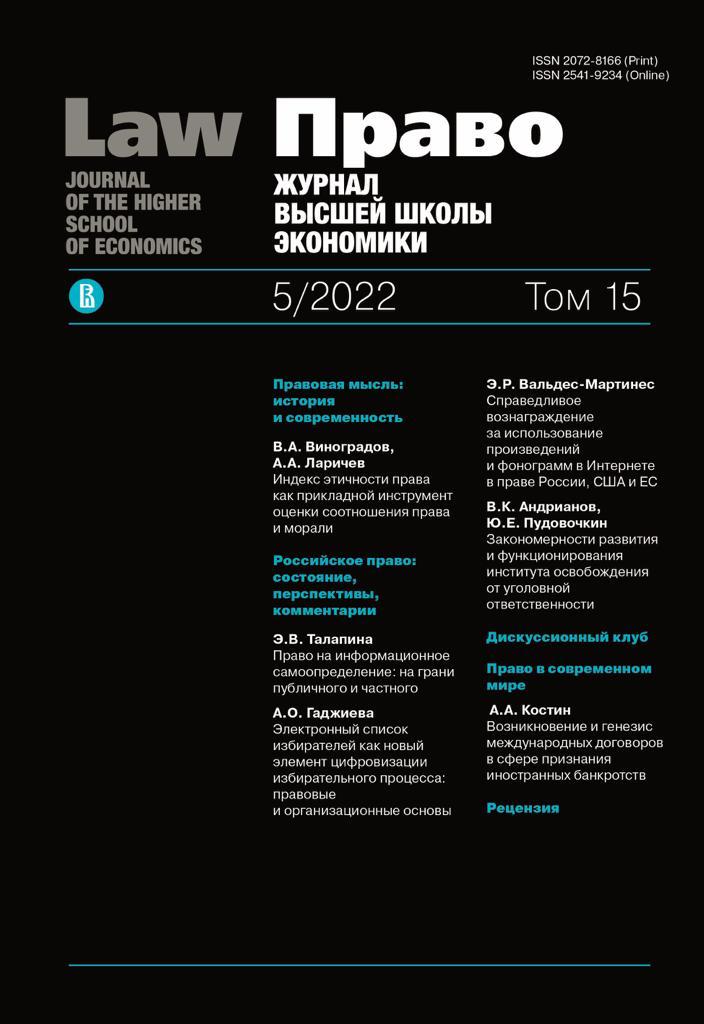Russian Constitutionalism and the Mobilization Trend in the Economy
Abstract
In the conditions of aggravation of geopolitical problems, economic sanctions against Russia, the need to use the mobilization economy as a means of enhancing the effectiveness of the current economic model is stated. As a scientific problem, the question of the necessary framework of constitutional and legal support for the regime of the mobilization economy is highlighted. On the basis of an interdisciplinary analysis, the characteristic of the mobilization economy as a political and economic concept is given, in which there are important legal aspects: the expansion of public law regulation of market relations, the reduction of economic rights and freedoms and the extraordinariness in the use of legal means. The regime of the mobilization economy, although it contains significant aspects of political and economic expediency, should be based on the ideas of constitutionalism, the constitutional model of the economy. It is shown that in the global political and economic confrontation between Russia and unfriendly countries, the universal features of constitutionalism should not absorb the national constitutional identity of our state. Constitutional principles in the economy make it possible to more effectively use the potential of law, its supremacy, clarity, reasonableness and certainty of the law in overcoming critical problems on the basis of consolidating the efforts of the state and society. The concept of mobilization constitutionalism is highlighted and its characteristics are given. A number of practical proposals for improving the legislative and institutional framework of mobilization constitutionalism are substantiated. Thus, it is proposed be the author to adopt federal laws on nationalization, expropriation, and economic development plan in the context of global economic challenges; strengthening the expert and analytical role of the Russian Federal Assembly through the formation of the Supreme Economic Council; expanding the powers of the State Council of the Russian Federation in the field of coordination of strategic economic planning.
References
Andreeva G.N. (2006) Economic constitution in foreign countries. Moscow: Nauka, 268 p. (in Russ.)
Armstrong K. (2020) The History of God: 4000 years of Search in Judaism, Christianity and Islam. Moscow: Alpina, 494 p. (in Russ.)
Astafichev P. A. (2021) Realization of constitutional human and civil rights and freedoms under pandemic. Vestnik Sankt-Peterburgskogo universiteta MVD = Bulletin of the Saint Petersburg University of the Internal Ministry, no. 1, pp. 42-53 (in Russ.) DOI: https://doi.org/10.35750/2071-8284-2021-1-42-53
Baburin S.N. (2020) Integration constitutionalism. Moscow: Norma, 264 p. (in Russ.)
Bersenev V.L. (2016) Mobilization model of economy: historiographical analysis. In: History of science and technology in the modern system of knowledge: 6th annual conference of the department of history of science and technology. Yekaterinburg: University Press, pp. 16-20 (in Russ.)
Bondar N.S. (2017) Economic constitutionalism of Russia: essays on theory and practice. Moscow: Norma, 272 p. (in Russ.)
Chirkin V.E. (2013) Foreign constitutionalism: the outline of development. In: The Constitution of the Russian Federation: from the image of future to reality. T.Ya. Khabrieva (ed.). Moscow: Jurisprudence. 592 p. (in Russ.)
Fonotov A. G. (1993) Russia: from a mobilization society to an innovative one. Moscow: Nauka, 272 p. (in Russ.)
Fukuyama F. (2008) America at the crossroads: democracy, power and nonconservative heritage. Moscow: AST, 282 p. (in Russ.)
Glazyev S.Yu. (1999) It's time to declare mobilization. Kommersant = Merchant, no. 15, p. 20 (in Russ.)
Korneychuk B.V. (2017) Mobilization scenarios of development: sources and consequences. Terra Economicus, no. 1, pp. 79-88 (in Russ.)
Kovalev A.M. (1997) Current French constitution (issues of constitutional reform). Gosudarstvo i pravo = State and Law, no. 4, pp. 91-100 (in Russ.)
Kharchenko I.S. et al. (2021) Mobilization economy: history and modernity. Gosudarstvemmoye i municipalnoye upravlrenie = State and Municipal Administration, no. 3, pp. 146-152 (in Russ.)
Kravets I.A. (2020) Constitutional symbolism, modernization of the Constitution and information society (between constituent and information constitutionalism for Russia). Lex Russica = Russian Law, no. 1, pp. 43-58 (in Russ.) DOI: https://doi.org/10.17803/1729-5920.2020.158.1.043-058
Morozov N.M. (2011) Mobilization type of development of Russian civilization. Vestnik Tomskogo Universuteta = Bulletin of the Tomsk University, no. 2, pp. 172-183 (in Russ.)
Osipov M.Yu. (2017) Implementing provisions of the Federal Law On strategic planning. Gosudarstvennaya vlast i mestnoye samoupravlenie = State Authority and Local Self-Government, no. 12, pp. 8-13 (in Russ.)
Shayo A. (2001) Self-restraint of power (a short course of constitutionalism). Moscow: Jurist, 292 p. (in Russ.)
Sedov V.V. (2009) Mobilization economy: from practice to theory. Mobilization model of economy: historical experience of Russia in 20th century. Chelyabinsk: Encyclopedia, pp. 7-9 (in Russ.)
Shokhin S.O., Kudryashova E.V. (2018) Economic sphere management based on strategic planning: legal aspects. Moscow: MGIMO, 246 p. (in Russ.)
Shpengler O. (2014) The decline of the Western World: essays. Moscow: ALFA-Book, 1085 p. (in Russ.)
Studwell D. (2017) The Asian management model: successes and failures of the most dynamic region in the world. Moscow: Alpina, 530 p. (in Russ.)
Vasilyeva T.A. (2019) EU Court and constitutional courts of member states in search of constitutional identity. Works of the Institute of State and Law, no. 2, pp. 32-54 (in Russ.) DOI: https://doi.org/10.35427/2073-4522-2019-14-2-vasilieva
Zorkin V.D. (2020) Law against chaos. Moscow: Norma, 368 p. (in Russ.)
Zorkin V.D. (2022) The law of Russia: alternatives and risks in front of the global crisis. Rossiyskaya Gazeta. 30.06. (in Russ.)
Copyright (c) 2022 Law Journal of the Higher School of Economics

This work is licensed under a Creative Commons Attribution-ShareAlike 4.0 International License.


















